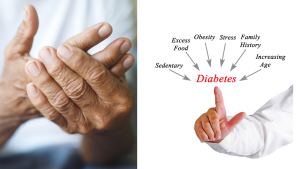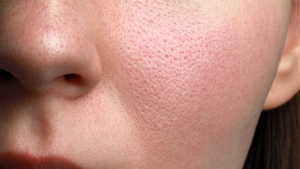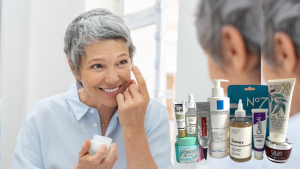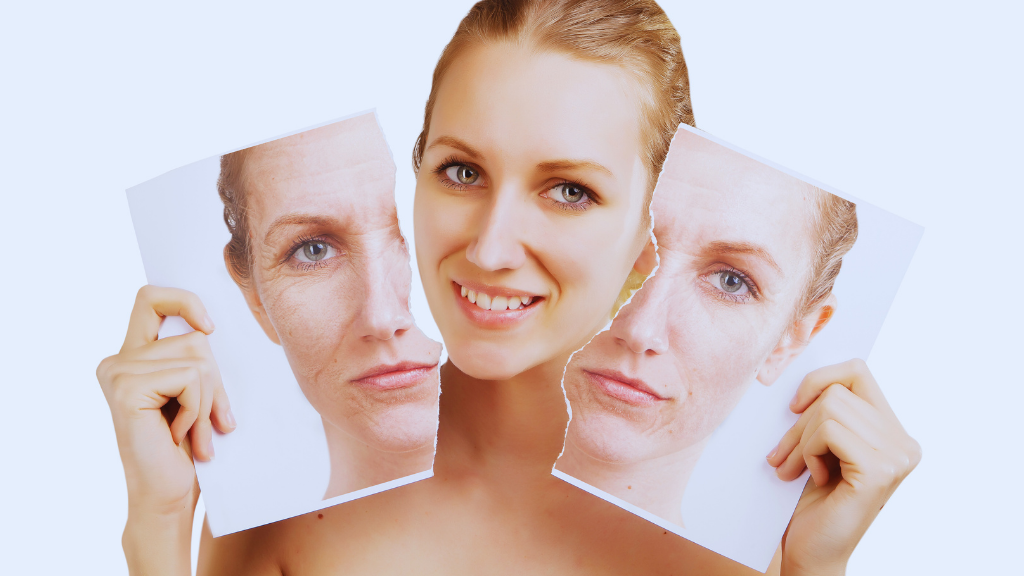Anti aging refers to a broad range of practices, products, and lifestyle choices aimed at slowing down or minimizing the visible signs of aging, promoting longevity, and maintaining overall well-being as we grow older. Here are some key factors to consider:
A consistent skincare routine, including cleansing, moisturizing, and using products with retinol, collagen, antioxidants, and hyaluronic acid, can help maintain skin health and reduce signs of aging. Sun protection is crucial for preventing premature aging and includes using broad-spectrum sunscreen with a high SPF, wearing protective clothing, and wearing sunglasses.
A healthy diet, including fruits, vegetables, whole grains, lean proteins, and healthy fats, is essential for overall health and anti-aging benefits. Regular exercise improves cardiovascular health, boosts circulation, and maintains muscle strength and flexibility.
Stress management is crucial for preventing premature aging, and incorporating stress-reducing practices like meditation, yoga, deep breathing exercises, or hobbies can help mitigate its effects. Adequate sleep is essential for cellular repair, hormone regulation, and overall well-being, with 7-9 hours of uninterrupted sleep in a comfortable environment. Hydration is essential for maintaining healthy skin and overall health, and avoiding unhealthy habits like smoking, excessive alcohol consumption, poor nutrition, a sedentary lifestyle, and exposure to environmental toxins can also promote healthy aging.
READ THIS –The Science of Intermittent Fasting: Benefits, Methods, and Explained Terms – A Comprehensive Guide
The causes of aging

Aging is a multifaceted biological process influenced by both internal and external factors, with key causes contributing to its progression.
Cellular Senescence:
One of the main causes of aging is cellular senescence, which refers to the gradual deterioration and loss of function of cells over time. As cells divide and replicate throughout our lives, their telomeres (protective caps at the ends of chromosomes) shorten. This telomere shortening is associated with cellular aging and eventual cell death.
Genetic Factors:
Our genes play a role in determining the pace and characteristics of aging. Certain genes are associated with longevity, while others may increase susceptibility to age-related diseases. Genetic factors influence processes like DNA repair, cellular maintenance, and antioxidant production, impacting how we age.
Oxidative Stress:
Oxidative stress occurs when there is an imbalance between the body’s free radicals (unstable molecules) and antioxidants. Free radicals can damage cells and DNA, leading to aging and age-related diseases. Environmental factors, such as exposure to pollution, radiation, and toxins, can increase oxidative stress.
Inflammation:
Chronic inflammation has been linked to various age-related diseases. As we age, there is often a low level of chronic inflammation in the body, which can contribute to tissue damage and accelerated aging.
Hormonal Changes:
Hormones play a crucial role in regulating many bodily functions, and their decline as we age can impact overall health. For example, declining levels of growth hormone, estrogen, testosterone, and other hormones can affect metabolism, bone density, muscle mass, and cognitive function.
Lifestyle Factors:
Unhealthy lifestyle habits can accelerate the aging process. Factors such as poor nutrition, lack of exercise, smoking, excessive alcohol consumption, and stress contribute to cellular damage, inflammation, and increased susceptibility to age-related diseases.
Environmental Factors:
Extrinsic factors like exposure to ultraviolet (UV) radiation from the sun, air pollution, toxins, and certain chemicals can contribute to aging. These factors can damage cells, DNA, and collagen, leading to wrinkles, age spots, and other visible signs of aging.
Aging is a natural process, with factors beyond our control. However, adopting a healthy lifestyle, protecting ourselves from environmental damage, and managing stress can slow down the aging process and enhance our overall well-being as we age.
The effects of aging

Wrinkles and Fine Lines:
As skin loses elasticity and collagen production slows down, wrinkles, fine lines, and sagging skin can become more noticeable.
Age Spots and Pigmentation Changes: Increased melanin production can lead to age spots, dark spots, and uneven skin tone.
Thinning and graying hair:
Hair follicles can shrink and produce thinner, grayer hair as we age.
Decreased Muscle Mass and Strength: Muscle mass naturally declines with age, leading to decreased strength, flexibility, and mobility.
Decreased bone density:
Bone density tends to decrease as we age, making bones more fragile and increasing the risk of fractures and osteoporosis.
Joint stiffness and reduced mobility:
Joints may become stiffer and less flexible, leading to reduced mobility and an increased risk of conditions like arthritis.
Changes in vision and hearing:
Age-related vision changes can include presbyopia (difficulty focusing on nearby objects), cataracts, and increased sensitivity to glare. Hearing loss, particularly at higher frequencies, is also common with age.
Slower Metabolism and Weight Management Challenges:
The metabolic rate typically decreases with age, making weight management more challenging.
Cognitive Changes:
Aging can be associated with mild cognitive decline, including changes in memory, processing speed, and multitasking abilities. However, significant cognitive impairment, such as dementia or Alzheimer’s disease, is not a normal part of aging.
Reduced immune function:
The immune system becomes less efficient with age, making older adults more susceptible to infections and having slower recovery times.
Changes in Sleep Patterns:
Older adults may experience changes in sleep patterns, including lighter sleep, more nighttime awakenings, and reduced sleep quality.
Emotional and Mental Health:
The anti-aging industry
Emotional well-being can be impacted by life changes, the loss of loved ones, and the accumulation of life experiences. Mental health concerns such as depression and anxiety can also arise or become more prevalent.
Here are some potential developments that may shape the future of anti-aging: Aging as a Treatable Condition: With a deeper understanding of the biological mechanisms underlying aging, researchers are working towards treating aging as a modifiable condition rather than just targeting individual age-related diseases.
Genetic Interventions: Advances in genetic research and gene editing technologies like CRISPR-Cas9 hold potential for targeting specific genes associated with aging.
Advancements in stem cell research may lead to the development of therapies that can restore tissue function and promote rejuvenation.
Biomarkers of Aging: The identification and validation of reliable biomarkers of aging could revolutionize the field of anti-aging.
Personalized Medicine: With advancements in genomics, proteomics, and bioinformatics, personalized medicine approaches could be developed to tailor anti-aging interventions based on an individual’s genetic makeup, lifestyle factors, and environmental exposures.
The role of genetics in aging
Aging is a natural process that affects the body and mind in various ways. Common physical and cognitive effects include wrinkles, fine lines, age spots, pigmentation changes, thinning and graying hair, decreased muscle mass and strength, decreased bone density, joint stiffness and reduced mobility, changes in vision and hearing, slower metabolism and weight management challenges, cognitive changes, reduced immune function, changes in sleep patterns, and emotional and mental health concerns.
Age spots and pigmentation changes are caused by skin loss; collagen production slows down; and hair follicles shrink. Muscle mass declines with age, leading to decreased strength, flexibility, and mobility. Bone density decreases, making bones more fragile and increasing the risk of fractures and osteoporosis. Joint stiffness and reduced mobility can lead to reduced mobility and an increased risk of conditions like arthritis.
Age-related changes in vision and hearing include presbyopia, cataracts, and increased sensitivity to glare. Slower metabolism and weight management challenges are also common. Cognitive changes, such as memory, processing speed, and multitasking abilities, are common, but significant impairments like dementia or Alzheimer’s disease are not normal.
Sleep patterns may change with lighter sleep, more nighttime awakenings, and reduced sleep quality. Emotional well-being can be impacted by life changes, the loss of loved ones, and the accumulation of life experiences, and mental health concerns like depression and anxiety can also arise.
The role of lifestyle in aging
Lifestyle choices play a crucial role in the aging process and overall well-being. A healthy diet, regular exercise, avoiding tobacco and excessive alcohol consumption, and sun protection are essential for maintaining muscle mass, cardiovascular health, bone density, and reducing the risk of chronic diseases.
Stress management is essential for managing chronic stress and promoting healthy aging. Engaging in stress-reducing practices like exercise, meditation, yoga, deep breathing exercises, and hobbies can help manage stress and promote healthy aging.
Quality sleep is essential for cellular repair, hormone regulation, cognitive function, and overall well-being. Aim for 7-9 hours of uninterrupted sleep in a comfortable environment. Mental stimulation, such as mental exercises, learning new skills, and socializing, can help maintain cognitive function and reduce the risk of cognitive decline.
Staying connected with family, friends, and the community is crucial for emotional well-being and healthy aging. Regular health check-ups, screenings, and preventive care are essential for the early detection and management of health conditions. Regular visits to healthcare professionals can help identify and address potential issues before they progress.
Maintaining a positive outlook, practicing gratitude, fostering emotional resilience, and managing mental health are key aspects of healthy aging. While some aspects of aging are beyond our control, adopting a healthy lifestyle and prioritizing self-care can significantly impact the aging process and our overall well-being.
The role of diet in aging
Diet plays a crucial role in the aging process and overall health. A well-balanced diet provides essential nutrients that support cellular health, repair, and regeneration. Antioxidants, found in fruits, vegetables, nuts, and whole grains, help combat oxidative stress and reduce cellular damage, potentially slowing down the aging process and reducing the risk of chronic diseases. Hydration is essential for overall health, skin health, and cellular function.
Consuming an anti-inflammatory diet rich in fruits, vegetables, whole grains, nuts, seeds, and healthy fats can help reduce inflammation and support healthy aging. Adequate dietary fiber from whole grains, legumes, fruits, and vegetables is essential for digestive health and maintaining a healthy weight. Protein is essential for maintaining muscle mass, strength, and overall health as we age. Lean sources of protein like poultry, fish, legumes, and dairy products can support muscle health and prevent age-related muscle loss.
Omega-3 fatty acids, found in fatty fish, walnuts, flaxseeds, and chia seeds, have anti-inflammatory properties and support brain health. Limiting added sugars and processed foods can promote healthy aging and reduce the risk of age-related conditions like obesity, diabetes, and heart disease. Maintaining a healthy weight through appropriate caloric intake and portion control can also support healthy aging.
Eating a diverse and balanced diet ensures obtaining a wide range of nutrients, vitamins, and minerals necessary for optimal health and healthy aging. Consulting with a healthcare professional or registered dietitian for personalized dietary recommendations considering individual health conditions, nutrient requirements, and specific dietary needs is essential.
The role of exercise in aging
Exercise is crucial for healthy aging, providing numerous physical and mental benefits. It helps maintain muscle mass and strength, improve bone density, enhance cardiovascular health, promote joint health and flexibility, manage weight and body composition, boost cognitive function, enhance mood and mental well-being, improve sleep quality, increase energy levels and vitality, and enhance social engagement.
Aging is often associated with a decline in muscle mass and strength, but regular exercise, particularly resistance or strength training exercises, can counteract this decline. Weight-bearing exercises, such as walking, jogging, dancing, or weightlifting, can help improve bone density and reduce the risk of osteoporosis and fractures. Aerobic exercises, such as brisk walking, cycling, swimming, or dancing, can improve cardiovascular health, increase endurance, and reduce the risk of heart disease, high blood pressure, and stroke.
Joint health and flexibility are also promoted through exercises like stretching, yoga, or tai chi. Regular physical activity, combined with a balanced diet, helps manage weight and prevent weight gain. Exercise also stimulates the release of endorphins and neurotransmitters, which can improve mood, reduce anxiety and depression symptoms, and promote overall mental well-being.
The role of supplements in aging
Supplements are dietary products designed to supplement one’s diet and provide additional nutrients. They can address specific nutrient deficiencies that can occur with age, such as vitamin B12, calcium, or vitamin D deficiency in older adults. Consultation with a healthcare professional is recommended to identify these deficiencies and determine appropriate supplement use.
Antioxidant supplements, which protect cells from damage caused by free radicals and oxidative stress, are also recommended for those who cannot obtain sufficient antioxidants through diet, the evidence regarding their effectiveness and impact on longevity and disease prevention is mixed, and excessive doses may have adverse effects.
Omega-3 fatty acids, found in fatty fish, walnuts, flaxseeds, and chia seeds, have been associated with various health benefits, including brain and cardiovascular health. If obtaining sufficient omega-3s through diet is challenging, supplements like fish oil capsules can be considered, it is advisable to consult with a healthcare professional to determine the appropriate dosage and assess potential interactions with medications.
Vitamin D is crucial for calcium absorption and bone health, and older adults may require vitamin D supplementation. Blood tests can help determine if supplementation is necessary, and healthcare professionals can guide dosage.
The role of sleep in aging
Sleep is a vital component of overall health and well-being, particularly in the aging process. It plays a crucial role in restoration, repair, and rejuvenation processes, such as cellular repair, protein synthesis, and waste removal from the brain. Adequate sleep aids in brain health and cognitive function, enhancing memory consolidation, learning ability, attention, problem-solving skills, and overall cognitive performance.
Hormone regulation is also essential for sleep, with the release of growth hormones and appetite hormones playing key roles in weight management. Adequate sleep is associated with a reduced risk of cardiovascular diseases like high blood pressure, heart disease, and stroke. Emotional well-being and mental health are also essential, with adequate sleep promoting a balanced mood, emotional regulation, and resilience to stress.
Skin health is also affected by sleep, as increased blood flow during sleep allows for repair and rejuvenation. Poor sleep quality or insufficient sleep can contribute to skin conditions, accelerate skin aging, and impair the skin’s ability to recover from damage. Chronic sleep deprivation increases the risk of chronic conditions like obesity, diabetes, certain cancers, metabolic syndrome, and insulin resistance, which are linked to accelerated aging processes.
Energy and vitality are also enhanced by good sleep, enhancing physical performance, concentration, productivity, and resilience to stressors. Longevity may be associated with adequate sleep quality and duration, reducing the risk of premature aging-related diseases and mortality. To promote healthy aging, it is essential to prioritize quality sleep, aim for 7-9 hours of uninterrupted sleep in a comfortable environment, practice good sleep hygiene, and consult with a healthcare professional if sleep difficulties persist.
The role of stress in aging
Chronic stress significantly impacts the aging process and overall health. It can accelerate cellular aging by triggering the release of stress hormones like cortisol, which damage cells and impair their ability to repair and regenerate. This leads to various age-related conditions and a reduced lifespan.
Current stress is associated with telomere shortening, a marker of cellular aging. Shorter telomeres are linked to cellular aging, an increased risk of age-related diseases, and a reduced lifespan. Chronic inflammation and oxidative stress are associated with various age-related diseases, including cardiovascular disease, diabetes, neurodegenerative disorders, and certain cancers.
The immune system is negatively impacted by chronic stress, making individuals more susceptible to infections and diseases. Cognitive decline is also linked to chronic stress, with an increased risk of neurodegenerative diseases like Alzheimer’s. Sleep disruptions and insomnia are also exacerbated by stress.
Emotional well-being is affected by chronic stress, leading to an increased risk of anxiety, depression, and mood disorders. Lifestyle factors such as poor dietary choices, sedentary behavior, increased alcohol or tobacco use, and neglecting self-care practices contribute to accelerated aging and overall health decline.
Skin aging is also accelerated by chronic stress, exacerbating certain skin conditions like acne, eczema, or psoriasis. Overall well-being is negatively impacted by chronic stress, affecting physical, mental, and emotional health.
Managing and reducing stress is crucial for healthy aging. Strategies include regular exercise, mindfulness and relaxation techniques, social support, hobbies, time management, and seeking professional help if needed. Implementing stress-reducing practices can positively impact the aging process and overall health.
Anti aging tips for the 40s
- Sun protection is a must.
- Stick to a consistent skincare routine with quality products.
- Keep your skin hydrated with a good moisturizer.
- Exfoliate regularly to refresh your skin.
- Focus on antioxidant-rich foods and a balanced diet.
- Stay hydrated by drinking enough water daily.
- Exercise regularly for overall well-being.
- Prioritize quality sleep for skin repair.
- Manage stress through various techniques.
Anti aging skincare

Anti-aging skincare is a practice that aims to reduce visible signs of aging and promote a youthful complexion. It involves using gentle cleansers to remove dirt, impurities, and excess oil and using chemical exfoliants like alpha-hydroxy acids (AHAs) or beta-hydroxy acids (BHAs) to stimulate cell turnover. Moisturize your skin daily with hydrating ingredients like hyaluronic acid, glycerin, or ceramides. Protect your skin from the sun’s harmful UV rays by wearing broad-spectrum sunscreen with at least SPF 30 daily.
Eye care is crucial for the delicate skin around the eyes, and using specialized eye creams or serums can address concerns like crow’s feet, puffiness, or dark circles. Antioxidant serums, such as vitamin C, E, or green tea extract, can neutralize free radicals and protect the skin from environmental damage. Retinoids, derivatives of vitamin A, have powerful anti-aging properties, reducing fine lines, wrinkles, and age spots and improving overall skin texture. Peptides stimulate collagen production, promoting firmer and smoother skin.
Hydration masks or sheet masks provide extra moisture and nourishment, plumping the skin, reducing fine line appearance, and improving overall radiance. Maintaining a healthy lifestyle with a balanced diet, regular exercise, adequate sleep, stress management, and avoiding smoking or excessive alcohol consumption can also positively impact your skin’s appearance and overall well-being.
anti aging foods

A balanced and nutrient-rich diet can support overall health and potentially slow down age-related changes. Some nutrient-dense foods associated with potential anti-aging benefits include blueberries, strawberries, raspberries, and blackberries; leafy greens like spinach; fatty fish like salmon; nuts and seeds like almonds, walnuts, flaxseeds, and chia seeds; colorful vegetables like carrots, sweet potatoes, red bell peppers, and tomatoes; whole grains like quinoa, brown rice, oats, and whole wheat bread; green tea with polyphenols; yogurt with live and active cultures; dark chocolate with antioxidants; and water.
Berries are rich in antioxidants that protect cells from free radical damage; leafy greens like spinach; fatty fish like salmon; nuts and seeds like almonds, walnuts, flaxseeds, and chia seeds; colorful vegetables like carrots, sweet potatoes, red bell peppers, and tomatoes; whole grains like quinoa, brown rice, oats, and whole wheat bread; green tea with polyphenols; yogurt with live and active cultures; dark chocolate with antioxidants and moderate amounts of cocoa; and water.
Incorporating a variety of nutrient-dense foods into a balanced diet is crucial, and consulting with a healthcare professional or registered dietitian for personalized nutritional advice based on individual needs, health conditions, and dietary preferences is also recommended.
anti-aging products
Retinoids:
Retinoids, such as retinol and prescription-strength retinoids like tretinoin, are derived from vitamin A and are known for their anti-aging benefits. They can help reduce the appearance of fine lines, wrinkles, and age spots, improve skin texture, and promote collagen production.
Hyaluronic Acid:
Hyaluronic acid is a natural compound that helps retain moisture in the skin, keeping it hydrated and plump. It can diminish the appearance of fine lines and wrinkles and improve skin elasticity and firmness.
Antioxidants:
Antioxidants, such as vitamin C, vitamin E, green tea extract, or resveratrol, help protect the skin from free radical damage caused by environmental factors like UV radiation and pollution. They can help reduce signs of aging, improve skin tone, and provide a more youthful appearance.
Peptides:
Peptides are short chains of amino acids that can stimulate collagen production, improve skin elasticity, and reduce the appearance of wrinkles. They can help enhance the overall firmness and smoothness of the skin.
Exfoliants:
Exfoliating products remove dead skin cells, revealing fresher and younger-looking skin. Chemical exfoliants, such as alpha-hydroxy acids (AHAs) like glycolic acid or beta-hydroxy acids (BHAs) like salicylic acid, can help improve skin texture, minimize fine lines, and promote a radiant complexion.
Sunscreen:
Protecting the skin from harmful UV rays is essential for preventing premature aging. Look for broad-spectrum sunscreens with at least SPF 30 to shield the skin from UVA and UVB rays and reduce the risk of wrinkles, sunspots, and sun damage.
Moisturizers:
Proper hydration is key for maintaining a youthful complexion. Look for moisturizers that contain nourishing ingredients like hyaluronic acid, ceramides, or natural oils to keep the skin hydrated, plump, and smooth.
Eye Creams:
The delicate skin around the eyes is prone to showing signs of aging, such as fine lines, wrinkles, and dark circles. Eye creams specifically formulated for this area can provide hydration, reduce puffiness, and minimize the appearance of crow’s feet.
Masks and Treatments:
Anti-aging masks, serums, or treatments can provide an extra boost of hydration, antioxidants, or targeted ingredients to address specific concerns like dullness, uneven skin tone, or loss of firmness.
The worst anti aging products
1. Ineffective Topical Creams: Look for products backed by research and proven effectiveness.
2. Harsh Ingredients: Be wary of products containing irritants like alcohol or fragrances.
3. Excessive Exfoliants: Stick to gentle exfoliation to avoid skin irritation or damage.
4. Unsafe Injectables or Fillers: Always seek these treatments from qualified professionals.
5. Overpriced or overhyped products: Focus on ingredients and proven effectiveness rather than marketing claims.
6. Invasive or Risky Procedures: Consider the risks and benefits before opting for aggressive treatments.
7. Products Promising Instant Results: Long-term improvements take time, so be cautious of claims for immediate effects.
Consulting professionals ensure you choose products or procedures suited to your skin and needs.
FAQs about anti aging
- What is anti aging?
Anti-aging refers to practices, products, and interventions aimed at slowing down or minimizing the visible signs of aging, such as wrinkles, fine lines, age spots, and sagging skin. It encompasses various strategies, including skincare routines, lifestyle changes, and medical interventions, to promote a more youthful appearance and enhance overall well-being as individuals age.
- How can I prevent wrinkles and fine lines?
To help prevent wrinkles and fine lines, you can incorporate the following practices into your daily routine:
- Protect your skin from the sun by using sunscreen with a broad-spectrum SPF, wearing protective clothing, and seeking shade.
- Maintain a consistent skincare routine that includes cleansing, moisturizing, and using products with ingredients like retinol, peptides, or antioxidants.
- Avoid smoking, as it can accelerate the aging process and contribute to the formation of wrinkles.
- Stay hydrated by drinking plenty of water and incorporating hydrating skincare products into your routine.
- Get sufficient sleep and manage stress levels, as lack of sleep and chronic stress can contribute to premature aging.
- What ingredients should I look for in anti-aging skincare products?
When choosing anti-aging skincare products, look for ingredients that have been shown to have anti-aging properties. Some common ingredients include:
- Retinoids or retinol: These derivatives of vitamin A can help promote collagen production and reduce the appearance of wrinkles and fine lines.
- Peptides: Peptides are amino acids that can help stimulate collagen synthesis and improve skin elasticity.
- Hyaluronic acid: This naturally occurring substance helps retain moisture in the skin, keeping it hydrated and plump.
- Antioxidants: Ingredients like vitamin C, vitamin E, green tea extract, or resveratrol can help protect the skin from free radical damage and reduce signs of aging.
- Alpha-hydroxy acids (AHAs) or beta-hydroxy acids (BHAs): These acids can help exfoliate the skin, improve texture, and reduce the appearance of fine lines and wrinkles.
- Can anti-aging products really reverse aging?
While anti-aging products can help minimize the visible signs of aging and improve the overall appearance of the skin, they cannot reverse the natural aging process. These products can, however, help enhance the skin’s hydration, texture, and firmness, making it appear more youthful and healthy. Combining a comprehensive skincare routine with a healthy lifestyle, including a balanced diet and regular exercise, can have a positive impact on the aging process.
- Are there any non-invasive treatments for anti-aging?
Yes, there are various non-invasive treatments available for anti-aging. These may include:
- Laser therapies: Laser treatments can target specific skin concerns, such as wrinkles, sun spots, or uneven skin tone, by stimulating collagen production and improving skin texture.
- Chemical peels: These involve the application of a chemical solution to exfoliate the skin, leading to a smoother and more youthful complexion.
- Microdermabrasion: This procedure uses tiny exfoliating crystals or a diamond-tipped device to remove dead skin cells and promote cell turnover.
- Dermal fillers: Injectables like hyaluronic acid fillers can temporarily plump up the skin, reducing the appearance of wrinkles and restoring lost volume.
- Radiofrequency treatments: These treatments use radiofrequency energy to tighten the skin, improve collagen production, and reduce the signs of aging.
It’s important to consult with a dermatologist or healthcare professional to determine which non-invasive treatments are most suitable for your specific needs and goals.
- Can a healthy lifestyle slow down the aging process?
Yes, adopting a healthy lifestyle can have a positive impact on the aging process. Some key lifestyle factors that can slow down aging include:
- Maintaining a balanced diet rich in fruits, vegetables, whole grains, lean proteins, and healthy fats.
- Regular physical exercise, including both aerobic and strength training activities,.
- avoiding smoking and limiting alcohol consumption.
- Getting sufficient sleep and managing stress levels.
- Protecting the skin from sun exposure by using sunscreen and wearing protective clothing.
Questions about anti aging
1. What is best for anti-aging?
2. What makes your skin age faster?
3. How can I speed up my aging?
4. How do you overcome aging?
5. What stops your face from aging?
6. How can I look younger naturally?
7. What makes women look younger?
8. How can I look 20 years younger naturally?
9. What can I drink to look younger?
10. How can I look 10 years younger naturally?
11. How can I reverse my face’s aging naturally?
12. What not to mix with vitamin C?
13. When should vitamin C be avoided?
14. Who should not use vitamin C serum on their face?
15. What happens when you stop using vitamin C serum?
16. Is it better to use vitamin C serum at night or in the morning?
17. At what age should you start using vitamin C serum?
18. What happens if I use vitamin C serum every day?
19. What happens if you use vitamin C without sunscreen?
20. Can I apply sunscreen after vitamin C serum?
21. What should I avoid when applying vitamin C serum?
Questions about Vitamin C Serum
1. Does Vitamin C help with anti-aging?
2. What not to mix with vitamin C?
3. Which vitamin C serum is best for anti-aging?
4. Can I take vitamin E and vitamin C together?
5. What is the best match with vitamin C?
6. Which skin type should not use vitamin C?
7. Does vitamin C brighten skin?
8. Can I mix vitamin C serum with my cream?
9. Why do I get pimples after using vitamin C serum?
10. Does vitamin C serum bleach?
11. Can I use vitamin E and C at the same time on my face?
12. Can vitamin C serum cause skin darkening?
13. Can I use vitamin C serum without moisturizer?
14. Why does vitamin C serum turn dark?
15. How do I know if vitamin C serum is working?
16. What are the side effects of vitamin C serum?
17. How do I know if my vitamin C serum is good?
18. Who should not use vitamin C serum on their face?
19. Is it better to use vitamin C serum at night or in the morning?
20. At what age should you start using vitamin C serum?
21. What happens if I use vitamin C serum every day?
22. What happens if I use vitamin C without sunscreen?
23. Can I apply sunscreen after vitamin C serum?
24. What to pair with vitamin C serum?
Questions about face serums
1. What is the best face serum?
2. What serum makes skin look younger?
3. What three serums should I use?
4. Do face serums really work?
5. How do you know your skin type?
6. Does CeraVe have a serum?
7. Is CeraVe serum good for anti-aging?
8. What skin type is CeraVe best for?
9. Does CeraVe brighten skin?
10. Who should not use CeraVe?
11. Can dark people use CeraVe?
12. Can I use vitamin C with CeraVe?
13. What moisturizer goes well with vitamin C serum?
14. Can I apply serum without a moisturizer?
15. Can I leave serum overnight without moisturizer?
16. What are the disadvantages of face serum?
17. Can I leave the serum overnight?
18. Can I use sunscreen after serum?
19. Which serum is best for glowing skin?
20. Can I sleep with serum on my face?
21. What is the best age to use face serum?
22. Which is the best anti-aging serum?
23. What serum makes skin look younger?
24. What is the No. 1 face serum?
A healthy lifestyle, combined with a personalized skincare routine, can help promote overall well-being and support healthy aging.



